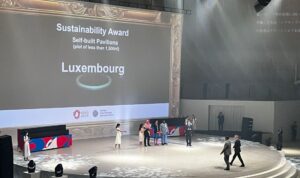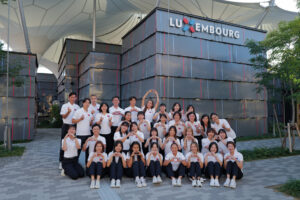8 Theme Weeks in 6 Months
Organizers and participants, along with the Japanese government, local authorities, exhibiting companies, industries from across Japan, and many other countries, will come together to discuss solutions to global-scale challenges through dialogue and various exchange formats, with the goal of driving concrete action.
Shortly after the Expo 2025 Osaka begins, the first focus will be on “Co-Creating Cultures for the Future” (25.04.-06.05.). Countries, institutions, associations, and regions will present and discuss cultural heritage, local communities, and cultural arts. Japanese manga and anime, for example, will serve as gateways to explore Japan’s diverse charms. Some countries will share their perspective on Japanese culture, discussing the fusion of manga with their own cultural identity. This week will explore how diverse values can coexist across time and space, maximizing the appeal and potential of new cultures.
Next, the spotlight shifts to “The Future of Community and Mobility” (15.05.-26.05.). Central questions for all societies will be addressed: How will we live? In times of smart cities, the metaverse, and AI, our lives are increasingly linked to technology, and this connection will only grow. Mobility is evolving rapidly—ideas from science fiction are becoming reality. The Expo will feature 100 autonomous buses operating inside and outside the Expo site. Japan’s Tokaido Shinkansen, the world’s first high-speed train, launched in 1964, remains the safest train system worldwide, thanks to its “Automatic Train Control System.” Environmentally friendly, it sets a global standard. The new SC Maglev Chuo Shinkansen will take these advancements even further, and guests will be able to learn about its social and economic impact.
What do we need to do to realize a future where everyone has access to food, clothing and shelter? Is this a naive utopia or actually possible? During the week dedicated to “Necessities of Life: Food, Clothing and Shelter” (05.06.-16.06.) we can explore whether it’s possible to ensure that everyone has access to these essentials. Food tech, smart agriculture, sustainable fashion, and ethical consumption will be highlighted. Visitors can meet for example innovators in wastewater treatment technologies, setting global standards in environmental engineering.
Health impacts us all. The “Health and Well-being” week (20.06.-01.07.) will see countries examine the connection between climate and health, presenting strategies to address climate change and public health through synergistic actions between the Paris Agreement (Nationally Determined Contributions – NDCs) and the UN’s 2030 Agenda (Sustainable Development Goals – SDGs). Topics like regenerative medicine, cell and gene therapy will also be addressed.
Artificial intelligence is one of the most widely discussed topics today, and it’s closely tied to “Learning and Playing” (17.07.-28.07.). This week will delve into lifelong learning, remote education, personalized learning, and gamification. Participants will get to know how new technologies—like AI, virtual reality, and data analytics—are already transforming education. It will be showcased how these cutting-edge tools are making learning more accessible, personalized, and impactful. Also, Japan`s largest exhibition for schools, educational institutions, corporate human resources and training departments, EDIX, will be present at Expo 2025 in Osaka.
Living in peace and feeling secure are basic human needs, yet they seem elusive in times of global conflicts and wars. “Peace, Human Security, and Dignity” (01.08.-12.08.) will address critical issues such as hunger, poverty, inequality, human rights violations, child labor, and human trafficking. Inclusion is key to a functioning society, whether it involves making life more accessible for people with special needs, achieving gender equality, or managing immigration effectively.
What do we do to preserve the earth for future generations with abundant and diverse life? “The Future of Earth and Biodiversity” Week (17.09.-28.09.) tries to find answers with the help of the Japanese Ministry of Environment in a Panel discussion on the theme of future decarbonized regional development. One event will focus on the essential shift to clean energy, mobility and industries, driven by the considerable impact of fossil-based economies on climate change. Which additional perspectives should be added to the global discussion on biodiversity beyond 2030? Suggestions will be made!
The Expo’s final theme week, “SDG+ Beyond Future Society for Life” (02.10.-12.10.), brings the focus back to the overarching theme of Expo 2025 Osaka, “Designing Future Society for Our Lives.” This closing week will feature case studies, stage performances, and workshops that examine the United Nations’ Sustainable Development Goals (SDGs). These 17 goals are designed to address challenges such as poverty, inequality, and environmental degradation, aiming to create a more just and sustainable world by 2030. Will the world be able to achieve them? Expo 2025 will seek to answer this question.




